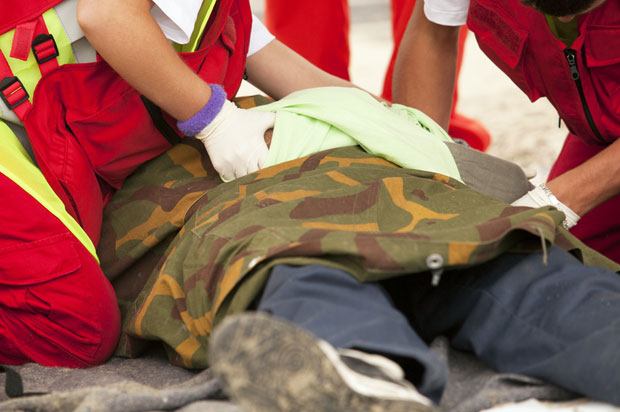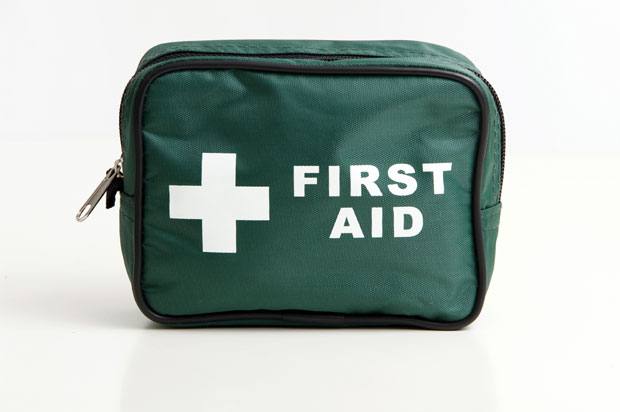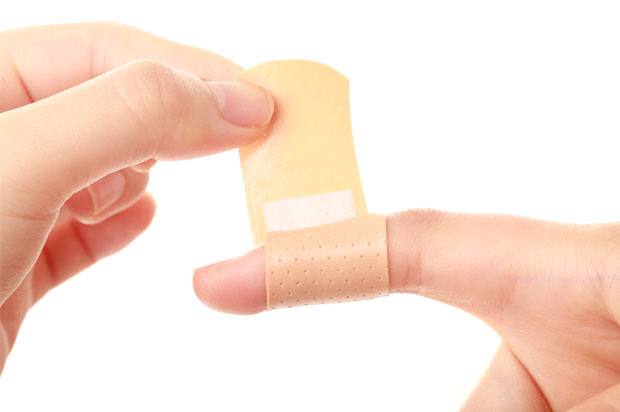First aid for crime victims
What to do if you find someone who's a victim of crime. Including first aid for muggings, spiked drinks, stabbings and glassings.

You need to act fast.
Look after yourself first
Your personal safety as a first-aider must come first. When you find anyone who has been attacked or injured, always check for danger. Is the attacker still around? If in doubt, stay away and call the emergency services instead, explaining that you’ll need an ambulance and the police to attend quickly.
If you’re sure you’re safe, talk to the crime victim to see if they make a response. If they can talk to you then their airway is clear and they’re conscious. If there’s no response check to see if they’re breathing, then call an ambulance.
Helping someone who’s been glassed
The main danger here is fragments of glass that may still be in the wound. Don’t pull fragments out of the wound, they cut on the way out as well as the way in, and may open up an artery. To stop the bleeding, avoid pressing down directly on the wound, instead press along the side of the wound.
First aid after a stabbing
Knives are rarely left in the body after a stabbing, but if you find someone with a knife still in them, leave it there. It may prevent further bleeding. If the knife is not there, apply pressure and lift up the part of the body that’s affected. If there is a sucking noise and bubbling of blood from a chest wound, air is getting in to the chest which is very serious. Sit the person up and press firmly over the wound to stop any more air getting in, or if possible place a handkerchief or pad over the wound and tie it to them with a scarf.
Treating people in shock
Many people who have been threatened, burgled, or had their bag snatched will experience a form of shock, even though there are no physical injuries. This includes an emotional response and clinical changes. Someone who is in shock is usually pale, shaky, light-headed, and feeling generally unwell. Sit them or lie them down somewhere warm, and put a coat over them. Talk to them gently and call for an ambulance as they will need medical attention.
Victim who’s been beaten up…
If someone has been punched, kicked, or hit with a blunt instrument in an attack, but not knocked unconscious, they still need to have an ambulance called for them. This is because blows to the head can cause concussion or bleeding into the brain, and blows to the abdomen can cause internal bleeding, both of which may be life threatening.
…and beaten unconscious
If someone has been knocked out but has regained consciousness, try to make them lie down and rest until medical help arrives. They may have one or more hidden injuries that they’re not aware of.
Helping a hit and run victim
If the pedestrian or cyclist are conscious when you find them, keep them in the position you found them in to avoid making their injuries worse, and call 999. If they are unconscious, very very gently turn them on their side to keep the airway open.
First aid if someone has their drink spiked
Get them to keep still, lying on their side if possible to keep the airway open. Never give them coffee, force them to vomit, or make them walk up and down – it might look good in the movies but in reality it’ll speed up the actions of the drug or poison in their body.
When emergency services arrive
Be aware that if you’re first on the scene you may have to be a police witness. Help the ambulance crew by telling them what you saw and what’s been done to the person, in as logical a sequence as you can. Let the emergency services take over, even if it’s your friend or relative you’re caring for.
Many thanks to Yvonne Dormer from St. John Ambulance for her help with this article.
Photo of first aid by Shutterstock
Next Steps
- Chat about this subject on our Discussion Boards.
By
Updated on 29-Sep-2015
No featured article








